
|
Tokyo Story (1953, Jp.) (aka Tokyo
Monogatari)
In Yasujiro Ozu's acclaimed, deliberately-paced melodramatic
masterpiece (the best film of his entire career) - a classic family
drama that illustrated how changing industrialized times in post-war
Japan of the 1950s had severed the virtue of children and society
honoring one's parents, and created tensions between generations
- [Note: It was inspired by the Leo McCarey film Make Way for
Tomorrow (1937).]:
- the sad yet realistic story was told mostly with
knee-high camera placement ("tatami-mat" shot)
- an elderly, unassuming middle-class couple from
the provincial western seaport coastal town of Onomichi: Shukishi
(Chishu Ryu) and 68 year-old Tomi Hirayama (Chieko Higashiyama)
had raised five adult children (one was deceased); their youngest
daughter Kyōko (Kyōko Kagawa) lived with them
and was a primary school teacher

Shukishi (Chishu Ryu)
|
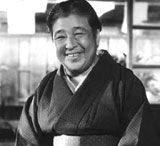
Tomi Hirayama (Chieko Higashiyama)
|
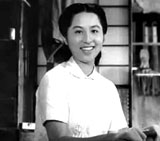
Kyōko (Kyōko Kagawa), Their Youngest
Schoolteacher Daughter
|
- the two parents planned on a two-week journey to travel
to Tokyo by train to visit all of their extended family members,
including two of their very career-minded, grown children:
they first arrived at the home of Dr. Koichi Hirayama (Sô Yamamura),
their eldest son - a pediatrician and doctor of internal medicine,
and his wife (their daughter-in-law) Fumiko (Kuniko Miyake) and their
two children (the grandchildren) - the older son Minoru and younger
son Isamu; also there to greet them was their visiting eldest daughter
Shige Harayama Kaneko (Haruko Sugimura), Koichi's sister
|
The Main Hirayama Family Members
|

Dr. Kiochi Hirayama
(Sô Yamamura), a Pediatrician, the Eldest Son
|
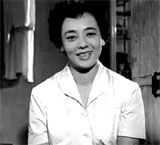
Fumiko Hirayama (Kuniko Miyake), Kiochi's Wife, a Daughter-in-Law
|

Shige Hirayama Kaneko (Haruko Sugimura), Kiochi's
Sister, the Eldest Daughter
|
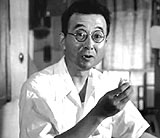
Kurazō Kaneko (Nobuo Nakamura), Shige's Husband
|
 \ \
Noriko Hirayama (Setsuko Hara), Daughter-in-Law
|
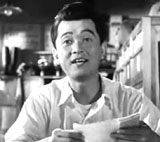
Keizō Hirayama (Shirō Ōsaka), Youngest Son
|
- at the Hirayamas, the older couple also met with
their kind-hearted, sincere and humble widowed daughter-in-law
Noriko (Setsuko Hara), a trading company office worker, whose husband
(their second son Shōji) had been MIA during the war eight
years earlier and was presumed dead
- the two adult children,
Kiochi and Shige were both polite to their undemanding parents,
but both privately felt interrupted, detached, and imposed upon in space, resources,
and time, etc.; the next day, Kiochi was called away by a sick patient,
and had to cancel a trip to a department
store, angering his young son who had a rude temper tantrum; since
their arrival, the elderly parents remained upstairs in Kiochi's home, because there
was nobody to take them out - everyone was too busy to entertain them
- the parents moved on to the home of Shige Kaneko,
their selfish eldest daughter who was the owner of the Ooh La La
Beauty Shop, a hair-dressing salon; her husband Kurazō Kaneko
(Nobuo Nakamura) had bought expensive cakes for the in-laws, but
then he and Shige ended up eating the cakes themselves; Shige was
stingy: ("They don't need such expensive cakes....Crackers would
have been good enough for them")
- Shige called Noriko to urge her to take a day off
from her work to usher the in-laws around to see the city's sights
on a tour bus: ("Father and Mother haven't been anywhere yet...I
really should take them myself, but I'm just too busy" - she
added); Noriko willingly and happily accepted the task to entertain
the in-laws - she was their only caring individual (and not even
a blood relative!); the older couple was graciously thankful and
grateful that Noriko had spent time with them: ("We saw so
many places, thanks to you") and that she served them borrowed
sake from a neighbor and a meal, although she humbly told them: "I
don't have much to offer"
- meanwhile, Shige and her husband were impatiently
asking themselves about the nuisance of the elderly visitors: "I
wonder how long they will stay in Tokyo...We can't do anything
for them here"; they were plotting to send the parents away to
the Atami Hot Springs Resort to keep them occupied while spending
as little money as possible on them; they rationalized to each
other: "You're busy, and I can't change my work schedule either"
- the older couple had a lonely, miserable time at
the resort and hotel due to the noisy nightlife of the other younger
guests and they decided to return to Tokyo after one night: ("This
place is meant for the younger generation"); they expressed
how they had quickly become homesick and were also hoping to go
back to their own home soon; Tomi experienced a brief dizzy spell
- prematurely back in the city earlier than expected, they had to split up: (Shukishi
joked: "We're really homeless now"); they packed up and went to
Ueno Park to await their next move; Tomi planned to spend the night
with Noriko, while Shukishi met old friends (the Hattoris) from
his hometown
- in the evening in the city,
Shukishi reverted to his habit of excessive drinking; while imbibing
with his old friends until midnight, he expressed some disappointment
and dissatisfaction that his highly-educated doctor
son didn't have a more promising career in the highly competitive
city of Tokyo; he also spoke about the major changes
in the younger generation: ("I was under the impression that
my son was doing better, but I've found that he is only a small neighborhood
doctor...but we can't expect too much from our children. We can't
be greedy....My son is really changed, but I can't help it. After
all, there are too many people in Tokyo...I suppose I should be happy")
- while with Noriko,
Tomi thanked her for taking her in and admitted: "I'm a burden to
everyone"; she encouraged Noriko to remarry at her young age:
("I feel sorry for you...because you're young, and...I feel we're
doing you wrong...Should you have the chance, please get married,
anytime you want...It pains us that you won't remarry"); Tomi suggested
that she might be lonely in her older years if she was alone; the
next morning, Tomi was completely and tearfully surprised by Noriko's
unexpected gift of some spending money
- later in the middle of the night, Shukishi (with
Hattori) was brought home drunk by police to Shige's place; she
nagged and expressed upset that her father had started drinking
again, and that they had to give up their futons for them: ("What
a bother...I hate drunkards. With a stranger, too. Oh, this is
disturbing")
- during the parents' early return to their home,
they planned to briefly see their younger son Keizō Hirayama
(Shirō Ōsaka),
a rail company employee, at the Osaka train station; unexpectedly,
the parents had to disembark and stay a day or two with him because
she had experienced travel sickness and a doctor had to be called
twice; he complained to a co-worker: "What a mess!...What
a bother"
- while reflecting on their visit, Shukishi and Tomi
both spoke about how their children had changed: "I'm surprised
how children change. Shige used to be much nicer before...When
a daughter is married off, that's the end of it....Children don't
live up to their parents' expectations. We can be greedy to no
end, but they're doing fine. They're certainly better than average.
We're fortunate....We should consider ourselves lucky"
- Tomi became deathly ill soon after arriving home
in Onomichi; a telegram was sent by Kyōko to the Tokyo children
about her condition: "Mother critically ill - Kyōko";
all of the next generation's children and Noriko quickly traveled
to Onomichi as Tomi entered into a coma and soon died (Keizō arrived
a few hours after her death although he was the closest, and he could
have been there if he had taken an earlier train)
- those who attended the
funeral (except for Noriko) were selfish, insincere, and guilt-ridden
(Keizō: "I
wasn't a very good son"); Shigi only worried about everyone
having proper "mourning clothes"; after the funeral at
a family meal, Shigi mentioned heartlessly: "I rather wish
he had died first. If Kyoko marries, he'll be left all alone," and
then she greedily inquired about taking some of her mother's clothes
with her

Family Members Gathered Around Tomi's Dead Body
|
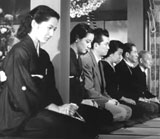
At the Funeral
|

Post-Funeral Family Meal Together
|
- Shigi, Kiochi and Keizō made plans to get tickets
and quickly left town on the night express train to attend to their
own busy lives, while it was expected that Noriko would remain
behind to help Kyōko, the youngest daughter
- just before Noriko departed about a week later,
Kyōko criticized her siblings for their coarse, ungrateful,
rude and uncaring attitudes: ("They're selfish. Demanding things
and leaving like this...Wanting her clothes right after her death.
I felt so sorry for poor Mother. Even strangers would have been
more considerate...I won't ever be like that. Then what's the point
of being family...Isn't life disappointing?"); Noriko tried to explain
to her how times had changed after children grow older, and that
she should be thankful that they were at least a little caring: ("They
have their own affairs...Children do drift away from their parents...They
have to look after their own lives...Children become like that gradually")
- in the tender concluding scene with the lonely father
before Noriko returned to Tokyo on the afternoon train, Shukishi
spoke about his wife's time with her as her "happiest time" in
Tokyo, and how he wished she would remarry: "I want to see
you married as soon as possible"; after he complimented her "nice,"
"good," and "honest" nature,
Noriko responded embarrassingly by admitting that she was
sometimes selfish, and didn't always think about her deceased husband
Shoji as he thought; he added: "I'll be happy if you forget
him,"
and she agreed that she must change and not be lonely anymore:
("My heart seems to be waiting for something")
- Shukishi presented Noriko with a memento - his dead
wife's "old-fashioned" wristwatch, to make her "happy"
- it brought tears to Noriko's eyes; he
also thankfully and gratefully noted to her: "It's strange.
We have children of our own, yet you've done the most for us, and
you're not even a blood relative. Thank you"
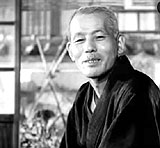
|
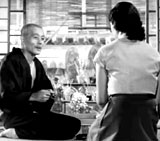
|

|
|
Shukishi Presenting Noriko With His Deceased Wife's
Wristwatch
|
- Kyōko watched the afternoon train leave from
the window of her classroom; sitting on the train, Noriko
knew that Shukishi would now suddenly be left to live
alone: (Shukishi: "Living alone, I feel the days will get very
long"); the film ended on a view of the solitary Shukishi fanning
himself - destined to be by himself for the remainder of his life
|

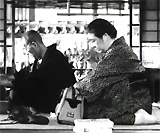 Elderly
Couple Shukishi and Tomi Preparing to Leave For a Visit to Tokyo Elderly
Couple Shukishi and Tomi Preparing to Leave For a Visit to Tokyo
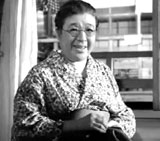
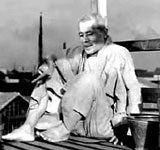
The Elderly, Undemanding Father and Mother Were Not Well-Hosted by Family
Members
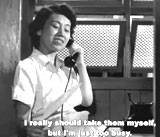
Shige Urging Noriko to Take the Parents On a Sight-seeing Tour of the
City
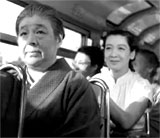
Noriko on a City Tour Bus with the Parents

Seeing the Tokyo Sights With Daughter-in-Law Noriko
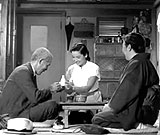
In Her Humble Apartment, Noriko Served Her In-Laws Sake and a Meal
After the Day's Tour
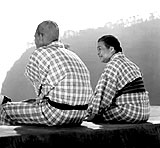
The Older Couple at the Spa Deciding to Leave After Only One Night
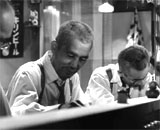
Shukishi Drinking With Old Friends - Expressing Concerns
About His Doctor Son
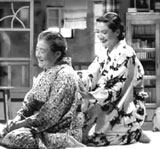
Tomi to Noriko: "I'm a burden to everyone"

Tomi: "Please get married"

The Parents' Early Return Home - at the Train Station

The Parents: "Children don't
live up to their parents' expectations"
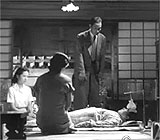
The Dying Tomi - Lying in a Coma

Kyoko's Complaints About The Uncaring Family Members

Noriko to Kyōko: "Children do drift away from their parents"
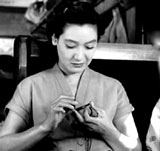
Noriko on the Afternoon Train Returning to Tokyo - with Tomi's
Wristwatch

Shukishi Sitting Alone
|



 Elderly
Couple Shukishi and Tomi Preparing to Leave For a Visit to Tokyo
Elderly
Couple Shukishi and Tomi Preparing to Leave For a Visit to Tokyo















